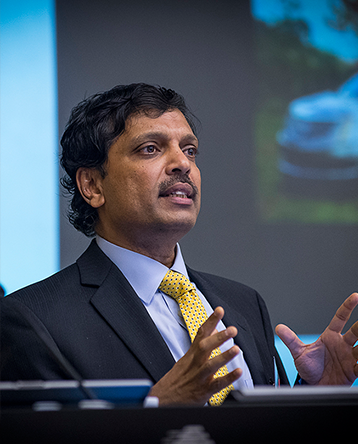

Click below to register.

Title: Making Autonomous Vehicles Safe
Abstract: The promise of autonomous vehicles is yet be realized in terms of safety, economic productivity, convenience and quality of life improvements. The pathway to the much-anticipated revolution in transportation has been expensive and still continues. This talk will highlight the challenges and opportunities for AI in transportation while offering the view that the problem and solutions need to take a macroscopic view that is broader than AI. The presentation will discuss how our work tackles the core necessities of safety, cost and scalability for deploying autonomous consumer passenger vehicles.
Speaker’s Biography: Prof. Raj Rajkumar is the George Westinghouse Professor of Electrical & Computer Engineering and Robotics Institute at Carnegie Mellon University, where he directs Safety21, the US DOT National University Transportation Center and the Metro21 Smart Cities Institute. He is considered a pioneer in autonomous driving technologies, and led the General Motors-Carnegie Mellon Connected and Autonomous Driving Collaborative Research Laboratory from 2004-20. He was on the Executive Committee that oversaw the CMU Tartan Racing team that won the 2007 DARPA Urban Challenge, and also led its Systems Engineering group. He has authored one book, edited another book, holds four US patents, and has more than 250 publications in peer-reviewed forums. Eight of these publications have received Best Paper Awards. He is a Fellow of the National Academy of Inventors, an IEEE Fellow, a co-recipient of the IEEE Simon Ramo Medal, and an ACM Distinguished Engineer. He received the Outstanding Technical Achievement and Leadership Award by the IEEE Technical Committee on Real-Time Systems. Prof Rajkumar’s work has influenced many commercial operating systems. He was also the founder of Ottomatika Inc that delivered the software intelligence for self-driving vehicles. Ottomatika was acquired by Delphi, now Motional. His work has been covered across prominent outlets in print, radio, TV and online media. His research interests include all aspects of cyber-physical systems with a particular emphasis on connected and autonomous vehicles.

Title: How should we measure the digital economy?
Abstract: Gross domestic product (GDP) measures production and is not meant to measure well-being. While many people nonetheless use GDP as a proxy for well-being, consumer surplus is a better measure of consumer well-being. This is increasingly true in the digital economy, where many digital goods have zero prices, and as a result, the welfare gains from these goods are not reflected in GDP or productivity statistics. We propose a way of directly measuring consumer’s economic well-being using massive online choice experiments. We find that digital goods generate a large amount of consumer surplus that is currently not captured in GDP.
Speaker’s Biography: Avinash (Avi) Collis is an Assistant Professor at the Heinz College of Information Systems and Public Policy at Carnegie Mellon University. He holds a Ph.D. in Management Science from MIT Sloan School of Management. His research interests include the economics of digitization, focusing on measuring the welfare gains from digital goods. His research has been covered in major media outlets and policy reports, including the New York Times, Wall Street Journal, Washington Post, the Economist, CNN, BBC, Financial Times, Bloomberg, and NPR, and reports by the US White House, Federal Reserve, Senate, and UK treasury. He is a member of the Federal Economic Statistics Advisory Committee (FESAC), which advises the Department of Commerce, BEA, BLS, and U.S. Census.
08:00 – 08:30 – Breakfast
08:30 – 09:30 – Session 1: AI and Autonomous Systems
09:30 – 10:30
10:30 – 10:40 – Break
10:40 – 12:00 – Session 2: Security, Privacy and Fault-Tolerant Systems
12:00 – 12:40 – Lunch
12:40 – 1:00 – IEEE Young Professionals Talk
1:00 – 2:20 – Session 3: Skills Development and Research Recognition
2:00 – 3:20
3:20 – 3:35 – Break
3:35 – 4:35 – Session 4: Influence in Digital Spaces and Power Flow Control
4:35 – 5:15 – Lightning Talks (3-minute talk for each poster)
5:15 – 6:15 – Reception and Posters
| Power Flow Control in a Modern Grid with Sen Transformer - Kalyan K. Sen (Sen Engineering Solutions, Inc.) |
| The Impact of Chatbots on Undergraduate Education - Julie Lawler (University of Pittsburgh) |
| Quantifying Exposure to Large Language Models in Millions of College Syllabi - Alireza Javadian Sabet (University of Pittsburgh) |
| FlashGuard: Real-time Disruption of Non-Price Flash Loan Attacks in DeFi - Abdulrahman Alhaidari (University of Pittsburgh) |
| KeyMask: A Secure Keyboard for Virtual Reality Applications - Yijun Yuan (University of Pittsburgh) |
| Who Spreads Hateful Conspiracy Theories? Gender Differences in Online Echo-chamber Discussions - Rr. Nefriana (University of Pittsburgh) |
Location: 3rd Floor Theater, Information Science Building, Pittsburgh, PA
(135 N Bellefield Ave, Pittsburgh, PA 15260)
Remote Option: Available via Zoom
If you have any question, reach us at: aba70@pitt.edu